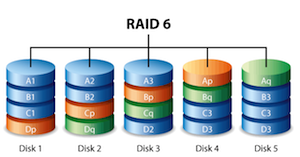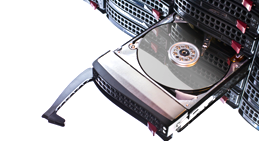- Data Recovery Home
- Data Recovery Services
- Hard Drive Recovery
- External & USB Drives
- RAID / Server Recovery
- NAS
- SSD
- SD Cards
- Mobile Phones & Tablets
- CCTV & DVR
- Macs
- Windows Computers
- Lost & Deleted Files
- Advanced Forensic Data Recovery (ADR) Services
- Password Recovery
- Forensic Investigation
- Encrypted Volumes
- Bitcoin, Crypto & NFT Wallet Recovery
- Tape Recovery
- Tape eDiscovery & Conversion
- Advanced Recovery Service
- Spare Parts & Donor Drives
- Disk Manufacturers
- SCSI Data Recovery
- SQL Recovery
- How Do Hard Drives Fail ?
- Locations
- Help & Advice
- News
- About Us / Contact
Recovering Data from RAID 6 Server Arrays
There are two distinct types of RAID 6 architecture: RAID6 P+Q and RAID6 DP.

P+Q architectures tend to perform better than DP architectures and are more flexible in the number of disks that can be in each RAID array. DP architectures usually insist that the number of disks is prime, something like 4+1, 6+1 or 10+1. This can be a problem as the physical disks usually come in units of eight, and so do not easily fit a prime number scheme.
RAID 6, although far less frequently used than RAID 5, accounts for a significant number of server setups. RAID 6 systems that we’ve recovered data from include Dell PowerEdge / PowerVault, HP Proliant, XServe and SuperMicro systems. In addition to a free collection service that ships your damaged RAID to us, we offer a UK call out service where we repair your RAID & recover your critical data onsite.
RAID 6 Failures
Specific failures on RAID 6 systems that we can recover data from include:
- RAID array / Controller Card Failure
- Controller Card Set-up Corruption
- RAID Container Crash
- Server won”t boot
- Server registry configuration lost
- Rebuild failure
- Damaged striping
- Multiple hard disk drive failure (or multiple drives go offline)
- Intermittent drive failure resulting in configuration corruption
- RAID array or volumes that won”t mount after a server crash
- Configuration damage or corruption
- Addition of incompatible drives
- Hardware conflicts
- Software corruption
- Software or operating system upgrades
Data Clinic’s RAID Recovery Service
With 15 year’s worth of RAID expertise, we know a thing or two about RAID 6 recoveries. In fact, two of the most high profile recoveries we’ve done to date were RAID 6 systems: one was for the Williams F1 team over a Grand Prix weekend, and the other we can’t talk about due to non-disclosure.
Our RAID Team operate countrywide and we can provide either onsite or offsite emergency services if required. Call us now on 0871 977 2525 or use the contact form to your right and we’ll call you.




